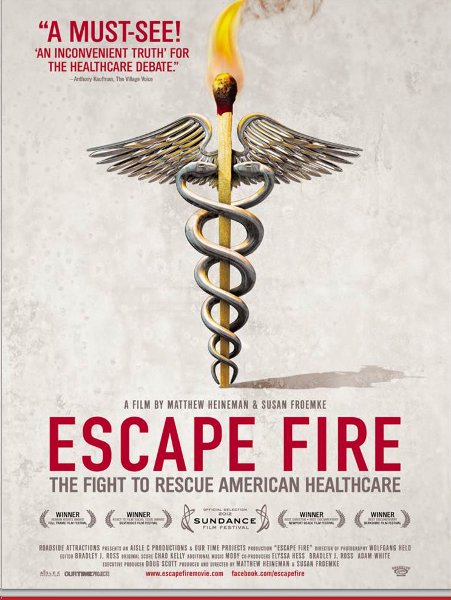‘Escape Fire’ Documentary Sheds Light on the American Healthcare Crisis

No matter one’s belief on the need to reform the healthcare system in the United States, it is hard to disagree that the system is in a state of disrepair if the best analogy to fix it is to start a fire to evade an even larger fire. In the documentary Escape Fire: The Fight to Rescue American Healthcare, filmmakers Matthew Heineman and Susan Fromke introduce the audience to the daunting task of reforming healthcare in the United States by telling the tale of the first escape fire, the act of starting a fire around oneself to escape a larger fire that cannot be outrun.
“The film was called A Tale of Two Systems, which is pretty much the worst film title you could possibly have,” said Heineman. “Somebody sent us an essay by Dr. Don Berwick [former Administrator to the Centers for Medicare and Medicaid Services] on the future of healthcare. In his essay, he draws this beautiful parallel between a forest fire in Mann Gulch, Montana in 1949 and our current healthcare system.”
Escape Fire, which opens October 5, 2012, is constructed on three-levels: the human element, the problems with healthcare and the examination of the solutions for providing world-class, cost-efficient healthcare. While a work of nonfiction, the message and narrative pace suffers to some degree without an impact singular villain-- no Roger for Michael Moore to badger, no McDonald’s dollar menu to clog Morgan Spurlock’s arteries or usurpers to the King of Kong throne. Only the mass poor decisions of nutritional diet, antiquated training of medical students and a system that is more profitable if the U.S. general population is in need of constant medicinal treatment. All scary, none of those elements are as compelling or remarkably concentrated as Heath Ledger’s Joker.
While every transition is not seamless, the documentary does flow for a majority of the viewing and creates compelling story arcs (unfortunately Oregon primary-care physician Dr. Martin’s story arc fizzles out at the end). The investigation into the individuals struggle in the United States healthcare system creates a greater impact when presenting the technical policy and numbers involved.
· 17 percent of the United States GDP or 2.7 trillion dollars is spent on healthcare.
· The United States ranks 50th in the world in life expectancy (imagine the outcry if the United States finished 50th in the London Olympics medal count).
· The United States spends $300 billion dollars on pharmaceuticals, which is more than the rest of the world combined.

Perhaps the most remarkable aspect to Escape Fire is a complete vacuum of political ideology within its narrative construct. Aside from the occasional sound bite from a prominent politician, there are no mentions of death panels (minus one viewer in Wasilla, Alaska), the film concentrates on the marrow that makes up the healthcare system in the United States – how the reimbursement system is a “fee for service system” where doctors are pressured to see as many patients as possible, the oversaturation of pharmaceutical products in mainstream media (fun fact: the United States and New Zealand are the only two countries where it is legal for pharmaceutical companies to advertise their products on television), and the copious amounts of money involved in the healthcare industry.
“We did not want to make a film that was a red film or blue film,” said Heineman. “We wanted to make an American film. This crazy hyperbolic debate that has happened in Washington has really missed the mark. So many of these films are partisan and just preach to the choir.”
As for the solutions and without giving too much away, it is uplifting to see the U.S. Army and other military branches try alternative forms of medicine- acupuncture, meditation and yoga instead of pills to heal wounded veterans. Safeway’s holistic corporate approach to providing their employees with incentives to take preventive measures against chronic, preventable diseases is rightfully lauded. Even the smaller steps such as doctors and primary-care physicians taking more time to talk with patients give hope the United States healthcare system is not irrevocably broken.
“You listen to the debate on healthcare on the evening news and it would just bring you down,” said Fromke. “What we found was there are a lot of examples of good healthcare out there. There are some solutions to our healthcare system. We wanted to bring something much more positive to help the nation shift its mindset and create a culture of health and fitness.”
Escape Fire does not have much of an ending. It ends with a beginning for the people it follows and who are striving to improve and innovate within the system. The documentary presents the problems with the U.S. healthcare system in a rational, touching way that makes the solutions seem not like pockets of fire started as a last resort but lagoons of possibility from which we can all drink.
Author Bio:
Kurt Thurber is a contributing writer at Highbrow Magazine.




























































































































































































































































































































